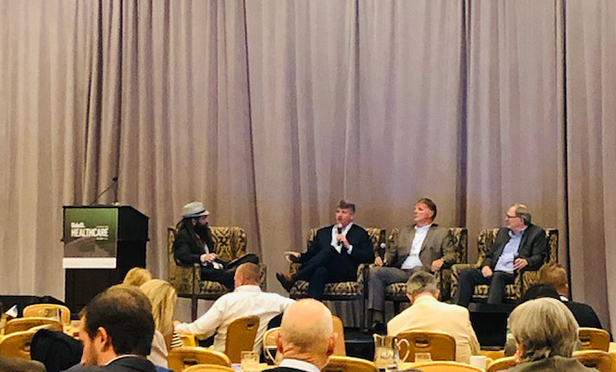 SCOTTSDALE, AZ—Healthcare real estate has become a more widely recognized asset class by both the domestic and international investment community. That is according to panelists and attendees at the recent GlobeSt. Healthcare Real Estate Conference. In past years, sales of medical office buildings reached record highs despite uncertainty over healthcare reform, value-based reimbursement and changes to the healthcare delivery setting. An aging population creates additional needs for healthcare services and will continue to increase demand for modern, well-located space for years to come, said panelists during the capital markets panel at the event, held earlier this month in Arizona.
SCOTTSDALE, AZ—Healthcare real estate has become a more widely recognized asset class by both the domestic and international investment community. That is according to panelists and attendees at the recent GlobeSt. Healthcare Real Estate Conference. In past years, sales of medical office buildings reached record highs despite uncertainty over healthcare reform, value-based reimbursement and changes to the healthcare delivery setting. An aging population creates additional needs for healthcare services and will continue to increase demand for modern, well-located space for years to come, said panelists during the capital markets panel at the event, held earlier this month in Arizona.
When moderator Gabriel Silverstein, managing director at SVN, asked panelists about getting business in today's market, Jim McMahon, VP of Capital One Commercial Banking, who has a portfolio of about $8-billion in debt, said that with a portfolio of that size, it is really about relationships.
"We are a relationship lender. We develop those relationships, and to get to our volume, we have to get a lot of repeat business," he said. "The way we do business is that we are very pragmatic and we always look for solutions."
When asked about the type of lending, he said that they do have a construction project, but typically aren't construction lenders. "Our typical borrower is usually private equity and typically with some JV operator." He also said he sees some institutional capital coming in. "Medical office has shown to be more resistant and we will continue to see that."
Panelist Ralph Cram, president and manager at Envoy Net Lease Partners, says his focus is with established developers who can get projects done. "We are focused a lot more on experienced liquidity and net worth."
When asked the same question, Steven Reedy, managing director at CIT, said that his company is open to doing some deals with family funds. As for structuring a deal, Reedy says CIT "looks in the future to see what the debt metrics will look like. That often times plays a role in how we structure a deal. It might be that that deal is more of a short term bridge loan."
Structuring for McMahon involves looking at what he next lender will be looking at when it is time to refinance the loan. "We take a hard look at that and debt yield."
For Cram, his exit consideration is more that he is an investment broker at the time of structuring. "We underwrite more conservatively if the developer is going to keep the deal than if he is going to sell it."
Overall, panelists noted that senior lenders are still highly focused on their ultimate take-out, whether sale or refinancing. The underwriting focus has continued to keep healthcare lending disciplined in this cycle and continues to force borrowers to have good tenant credit and lease terms, and to make any lack of that up with real additional equity to mitigate lender risks.
© 2025 ALM Global, LLC, All Rights Reserved. Request academic re-use from www.copyright.com. All other uses, submit a request to [email protected]. For more information visit Asset & Logo Licensing.








